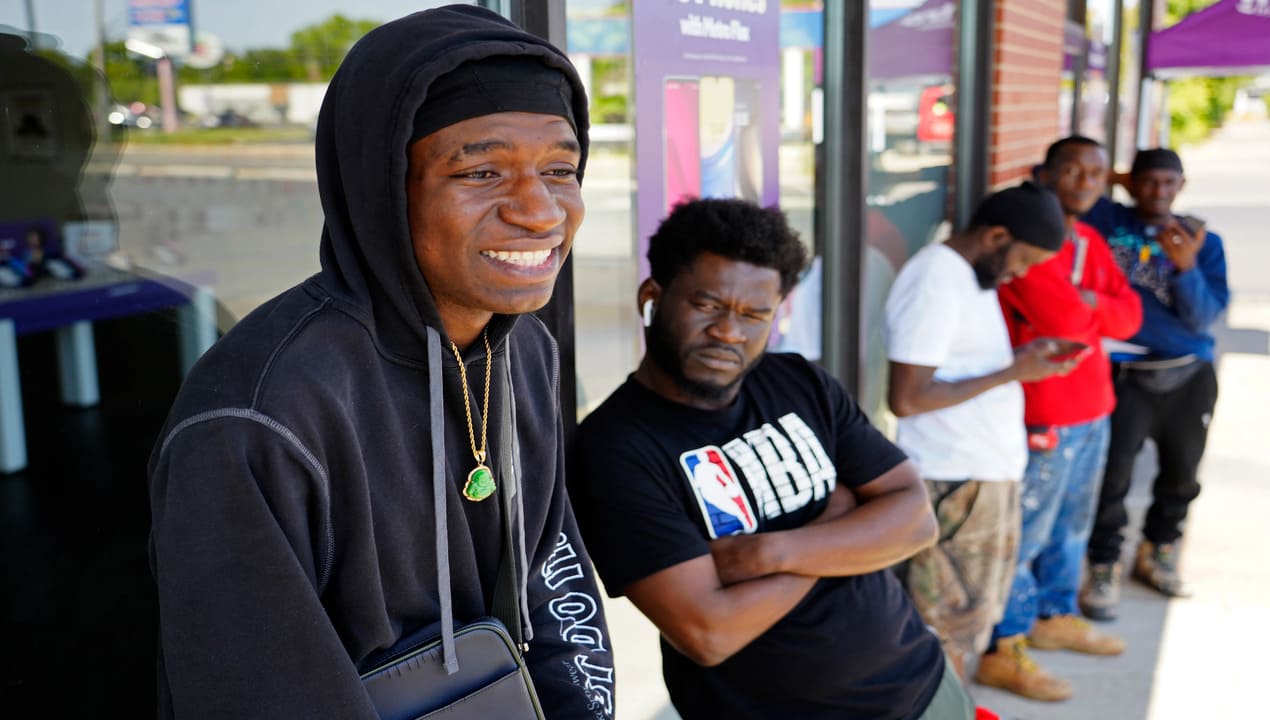
Independent Report – Last week, Michelet and his wife, Haitian immigrants, arrived at the St. Vincent de Paul Community Center in Springfield, Ohio, seeking help. Accompanied by their newborn son, they hoped to apply for a U.S. passport is an important document they currently struggle to obtain due to their uncertain immigration status. Holding on to faith over fear, they believe this small step could help secure a better future for their child.
For the couple, their son’s passport would serve as crucial proof that he is a U.S. citizen. However, they understand that their son’s citizenship will not stop the Trump administration from moving forward with plans to deport them back to Haiti, a country still plagued by violence and instability.
Michelet, who only shared his first name to avoid drawing attention from immigration authorities, said he has no interest in migrating to a third country. He believes his pending asylum case is his best chance to remain in the United States. Having worked for a local auto parts company since arriving from Chile more than two years ago, he feels rooted in the Springfield community.
Some Haitian migrants began exploring alternatives after the Department of Homeland Security (DHS) announced on June 27 that it would end the Temporary Protected Status (TPS) program for Haitians effective September 2. TPS had granted legal status to Haitians after the 2010 earthquake and had been renewed multiple times due to ongoing gang violence and unrest.
Although a federal judge in New York temporarily blocked the decision on July 1, the Trump administration is expected to appeal. The Supreme Court has already ruled in favor of a similar action that ended TPS protections for Venezuelans.
A White House spokesperson claimed the earthquake no longer posed a danger, stating that ending TPS fulfilled Trump’s promise to “restore sanity to our immigration system.” Haitians, she said, could still seek legal status through other avenues. But for many, those paths are inaccessible.
Also Read : Nobel Peace Prize 2024: Potential Laureates & Selection Process
Springfield is home to an estimated 10,000 to 15,000 Haitian nationals. Employed in sectors like Amazon warehouses and auto parts manufacturing, they play a key role in supporting the local economy. Predominantly Christian, many rely heavily on their faith when coping with fears of deportation.
“I’m going to stay here. I’m not afraid,” said Jean Marc, a warehouse worker in his twenties. “Jesus put me here.” His sentiment echoes that of many Haitians interviewed by Reuters. Most of whom are relying on asylum claims in hopes of staying in the U.S. None considered relocation to a third country as a viable option, citing financial limitations and lack of connections.
Despite being in the middle of legal proceedings, some asylum seekers have already been detained by immigration authorities. Many Haitians in Springfield still remember the wave of hostility they faced last year after false rumors circulated on social media accusing them of harming local pets—claims that were even repeated by Trump during his campaign speeches.
Casey Rollins, executive director of the St. Vincent center, noted that many in the Haitian community were in denial about the severity of the situation. “They really believe that God will protect them, or that somehow the government will change its mind,” she said. “It’s this powerful faith they hold on to.”
At the Haitian Community Help and Support Center just outside downtown Springfield, a man in his fifties known only by his initials, M.B., lifted his shirt to reveal a scar on his chest from when he was tortured in Haiti six years ago. He believes the attack was politically motivated. M.B. currently works for a local manufacturer under TPS and is consulting with a lawyer to seek asylum. “This is the only country we’ve lived in besides Haiti,” he said. “We have nowhere else to go.”
Conditions in Haiti remain dire. Gang violence has displaced over 1.3 million people. Hospitals have closed, the government is paralyzed, and much of the economy is in collapse. I.M., a Haitian man in his twenties and a brain cancer survivor. Fears returning to Haiti would mean losing access to life-sustaining medication. Though he refuses to flee to another country, he said he would rather return voluntarily than be detained and deported in shackles.
“I’ll leave before September 2 just so I’m not treated like a criminal,” he said, pointing out that the U.S. State Department itself warns Americans against traveling to Haiti due to rampant crime and civil unrest.
Viles Dorsainvil, director of the Haitian Community Help and Support Center. Explained that most Haitians lack the financial means or family ties to move to other countries like Canada or Brazil. “It’s a Catch-22,” he said. “It’s so sad.”
Yet, despite the looming uncertainty, many Haitians in Springfield remain steadfast. Anchored by faith, hope, and a desire to protect their families. They continue to stand firm in the only country they now call home.
Also Read : Seine River Reopens for Swimming After 100 Years, Is It Safe?